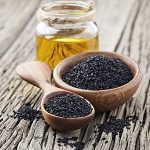
There are many healthy berries you can add to your diet. The acai berry (Euterpe oleraceae) is one of the most nutritious berries on the planet. Also called the Amazonian palm berry, acai is native to the Amazon rainforest. This fruit has been heralded for centuries for its healing, immune-stimulating, energy-boosting properties. Research reveals this antioxidant-rich berry may help suppress and repair oxidative damage.[1] Let’s take a look at twelve health benefits of acai berries.
Acai Berries: What Are the Benefits?
- Promotes Heart Health
- Stops Bad Cell Proliferation
- Aids Weight Loss
- Promotes Skin Health
- Helps Digestion
- Reduces Irritation
- Improves Cellular Health
- Immune System Booster
- Has Anti-Aging Effects
- Boosts Energy
- Encourages a Healthy Libido
- Improves Mental Function
1. Promotes Heart Health
Like red wine, acai berries are extremely high in anthocyanins, a type of antioxidant that supports balanced cholesterol levels.[2, 3] They are also rich in plant sterols that provide cardioprotective benefits, including supporting circulation, improving overall blood composition, and relaxing the blood vessels.[4, 5]
2. Stops Bad Cell Proliferation
Acai berries are powerhouses against bad cell growth. Multiple studies have found that the anthocyanins and polyphenols found in acai berries have strong antiproliferative properties – which means they stop bad cells from growing out of control. Studies have found up to 95% inhibition from acai.[6, 7, 8] It is thought that these phytochemicals can disrupt cell mutation at a molecular level, killing the affected cells before they multiply.
3. Aids Weight Loss
Acai may help you lose weight and maintain a healthy weight. One interesting study found that eating 200 grams of acai pulp reduced total body fat, reduced skinfolds, and increased insulin sensitivity in overweight women.[9] In the same study, women whose body weight was normal experienced a redistribution of body fat, with reduced subcutaneous body fat but increased visceral fat.
4. Promotes Skin Health
Natural skin care products made with acai oil are a great natural alternative to chemical-based skin care products. Currently, many beauty products contain acai oil because of the oil's high antioxidant content. Its skin care benefits aren’t limited to an external application. When eaten, the berries provide nutrition that can give your skin a healthy glow. In fact, Brazilians have been eating acai berries for centuries to promote skin health.[10]
5. Helps Digestion
Acai may aid in keeping the digestive system clean and functioning normally. These berries have powerful detoxification capacities, and flour made from the seeds is a good source of dietary fiber.[11] Of course, there are other high fiber foods that do the same thing, including other berries.
6. Reduces Irritation
Acai seed extract has properties that may prevent irritation in the lungs typically associated with respiratory distress and swelling from smoke inhalation.[12] Although I recommend quitting smoking or never starting in the first place, if you smoke or are exposed to secondhand smoke, acai’s antioxidant properties may reduce smoke-induced swelling inside of your lungs.
7. Improves Cellular Health
Acai plays an important role in the body’s cellular protection system, helping to keep cells strong against the invasion of free radicals. Acai has the strongest activity of any fruit or vegetable tested to date against the peroxyl free radical and superoxides, which cause cell damage.[13] The antioxidants in acai enter human white blood cells and perform an “oxygen quenching function” at very low doses. That’s why acai is called a superfood!
8. Immune System Booster
People call acai a superfood for a good reason. Studies have found that consuming acai fruit boosted the production of human gamma delta T cells in cell cultures, which are an important part of the immune system. When given directly to people, acai also boosted the production of interleukin 12 (IL-12) as well as myeloid cells, a type of white blood cells which ensure your immune system is healthy.[14]9. Has Anti-Aging Effects
Extremely high in many forms of phytochemicals, acai berries may slow or reverse aging processes as they relate to oxidative damage.[15] In fact, the berries are one of the best sources of antioxidants; acai berries have ten times as many antioxidants as grapes and twice as many as blueberries.
10. Boosts Energy
Due to its overall health benefits, taking acai extract can lead to increased energy and stamina and may even help combat fatigue and exhaustion – especially after exercise.[16] In one study, drinking an acai beverage not only reduced the body’s metabolic stress from exercise, but it also reduced the exerciser’s perceived exertion, which is how much effort they felt they were expanding. It also increased the time before they felt exhausted. Whenever you need a boost, simply eat a handful of berries, and you will be ready to go in no time!
11. Encourages a Healthy Libido
Although not an aphrodisiac per se, this famous purple berry is linked to overall increased blood circulation in the human body, a phenomenon that may contribute to a boost in sex drive, especially for men. When overweight men consumed an acai smoothie, it led to improved vascular function, which is a characteristic of how blood flows through the body’s blood vessels.[17]
12. Improves Mental Function
Acai is high in anthocyanins and other neurologically active plant compounds (phytochemicals). Preliminary research studies show that acai may improve short and long-term memory and promote healthy brain aging.[18, 19] Scientists have studied how acai may protect against neurological diseases, including dementia.
Consuming Acai Berries
When searching for acai berries, only buy certified organic acai berries and pulp. Not only are they the most healthy, but they taste the best, too. If you can't find acai berries, goji berries are another good source of antioxidants.

Natural Anti-Aging Solutions
Length: 73 minutes
References (19)
- Chin, YW, et al. "Lignans and Other Constituents of the Fruits of Euterpe Oleracea (Açai) with Antioxidant and Cytoprotective Activities." J Agric Food Chem. 2008;56(17),7759-64.
- de Rosso, VV, et al. "Determination of anthocyanins from Acerola ( DC.) and Açai ( Mart.) by HPLC–PDA–MS/MS." J Food Composit Anal. 2008;21(4),291-9.
- de Souza, MO, et al. "The hypocholesterolemic activity of Açaí ( Mart.) is mediated by the enhanced expression of the ATP-binding cassette, subfamily G transporters 5 and 8 and low-density lipoprotein receptor genes in the rat." Nutr Res. 2012;32(12),976-84.
- Feio, CA, et al. "Euterpe Oleracea (Açai) Modifies sterol metabolism and attenuates experimentally-induced atherosclerosis." J Atheroscler Thromb. 2012;19(3);237–45.
- Rocha, APM, et al. "Endothelium-dependent vasodilator effect of Mart. (Açaí) extracts in mesenteric vascular bed of the rat." Vascul Pharmacol. 2007;46(2),97-104.
- Hogan S, et al. "Antiproliferative and antioxidant properties of anthocyanin-rich extract from açai." Food Chem. 2010;118(2),208-214.
- Pacheco-Palencia LA, et al. "Absorption and Biological Activity of Phytochemical-Rich Extracts from Açai (Euterpe oleracea Mart.) Pulp and Oil in Vitro." Food Chem. 2010;119(3), 1071-1078.
- Del Pozo-Insfran D, et al. "Acai (Euterpe oleracea Mart.) polyphenolics in their glycosidic and alycone forms induce apopotsis of HL-60 luekemia cells." J Agric Food Chem. 2006;54(4),1222-1229.
- Sousa Pereira, Izabelle de, et al. "The consumption of acai pulp changes the concentrations of plasminogen activator inhibitor-1 and epidermal growth factor (EGF) in apparently healthy women." Nutr Hosp (2015);32(2):931-45.
- Heinrich, M, et al. "Açai ( Mart.)—A phytochemical and pharmacological assessment of the species’ health claims." Phytochem Lett. 2011;4(1),10-21.
- de Souza Lima, C et al. "Preparation and characterization of the nutritive value of flour made from Acai (Euterpe oleracea, Mart.) seeds." Nat Prod J. 2014;4(3),224-28.
- de Moura, RS, et al. "Effects of Euterpe oleracea Mart. (AÇAÍ) extract in acute lung Inflammation induced by cigarette smoke in the mouse." Phytomedicine. 2012;19(3-4),262-269.
- Schauss, Alexander G., et al. "Antioxidant capacity and other bioactivities of the freeze-dried Amazonian palm berry, Euterpe oleraceae Mart. (Acai)." J Agric Food Chem. 2006;54(22),8604-8610.
- Holderness J, et al. "Polysaccharides isolated from açaí fruit induce innate immune responses." PLoSOne. 2011;6(2):e17301.
- Laslo, Mara, et al. "A botanical containing freeze dried açai pulp promotes healthy aging and reduces oxidative damage in sod1 knockdown flies." Age. 2013; 35(4),1117-1132.
- Carvalho-Peixoto, J, et al. "Consumption of açai (Euterpe Oleracea Mart.) functional beverage reduces muscle stress and improves effort tolerance in elite athletes: a randomized controlled intervention study." Appl Physiol Nutr Metab. 2015;40(7),725-33.
- Alqurashi, RM, et al. "Consumption of a flavonoid-rich açai meal is associated with acute improvements in vascular function and a reduction in total oxidative status in healthy overweight men." Am J Clin Nutr. 2016;104(5),1227-35.
- Poulose, SM, Shukitt-Hale, B. "Functional role of walnuts and açaí fruits on brain health." In: Patil, BS, et al. Tropical and Subtropical Fruits: Flavors, Color, and Health Benefits. Washington, DC: American Chemical Society (ACS), 2013:171-87.
- Carey, AN, et al. "Dietary supplementation with the polyphenol-rich açaí pulps (Euterpe oleracea Mart.) improves cognition in aged rats and attenuates inflammatory signaling in BV-2 microglial cells." Nutr Neurosci. 2017;20(4),238-245.
†Results may vary. Information and statements made are for education purposes and are not intended to replace the advice of your doctor. If you have a severe medical condition or health concern, see your physician.








